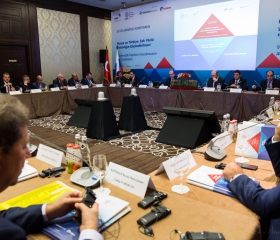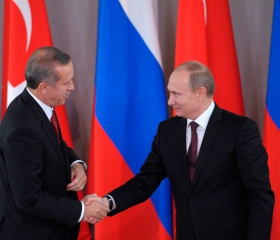In late 2014 when the launch of Turkish Stream was announced, it appeared that Russia and Turkey were entering a qualitatively new stage of relations. Strengthening energy cooperation was fueling confidence that the countries were on their way towards a strategic partnership. However, the beginning of the Russian military operation against the Islamic State, which has been declared by Russia as a terrorist group, has brought to the surface disagreements over the Syrian issue, which earlier had been rarely discussed amid friendly rhetoric.
In late 2014 when the launch of Turkish Stream was announced, it appeared that Russia and Turkey were entering a qualitatively new stage of relations. Strengthening energy cooperation was fueling confidence that the countries were on their way towards a strategic partnership. These new achievements were seemingly the natural result of nearly a century-long cooperation between Russia and the Republic of Turkey. This year Moscow and Ankara celebrate the 95th anniversary of the establishment of their diplomatic relations. However, the beginning of the Russian military operation against the Islamic State, which has been declared by Russia as a terrorist group, has brought to the surface disagreements over the Syrian issue, which earlier had been rarely discussed amid friendly rhetoric.
A wide-ranging discussion of these and many other issues was held last week at the International Conference of the Russian International Affairs Council (RIAC) entitled “Russia and Turkey: Strengthening the Multi-faceted Partnership.” Expert and political communities from both countries mainly agreed that due to geography, establishing partnership relations appears to be inevitable. The Black Sea straits play a key role in Russia's ability to project its influence on the Mediterranean, while Turkey's position is critically important for carrying out pipeline, transport and logistics projects, for ensuring security in the Black Sea and Caucasus regions, as well as for regulating the intensity of migration flows.
Given Turkey's geographical position, its foreign policy cannot but be anything but multi-vector in nature. This geographical position makes the country quite attractive for gas transport from Russia to Europe. On the other hand, Turkey is striving to play a major role in maintaining stability in the Middle East. But to this end, Ankara has to look for partners in the region itself, while the countries there are not always ready for unconditional cooperation with Turkey.
The Black Sea is a separate component of Turkish foreign policy. The country’s efforts to maintain the regime of the Black Sea straits stipulated by the Montreux Convention of 1936 are of vital importance as well. For Russia, this aspect of Turkey's foreign policy is of strategic significance. As for the conflict in Ukraine, Ankara has taken a special position and has put an emphasis on the rights of the Crimean Tatars. But for all the differences in their views on the Ukrainian crisis, Russia and Turkey continue to support the idea of a peaceful and safe Crimea.
Turkey's multi-faceted foreign policy is aimed at demonstrating the country’s importance in the world arena, however, with two reservations. Despite Ankara’s significant influence on the Balkans and Eastern Europe during the Ottoman era, with regards to its relations with the EU, Turkey is still sitting on the sidelines. The 40-year long wait of accession to the EU is clearly deterring the Turkish public from making the European choice. Relations with the Arab world leave much to be desired as well. Here, Turkey has been pushed into the background as well, as it has limited opportunities to influence regional affairs and is facing acute competition. It is only in relations with Moscow that Ankara has acquired the status of a geographically significant actor and, in a sense, becomes the gatekeeper of the Russian presence on the Mediterranean Sea.
In its relations with Russia, Turkey has been extremely pragmatic. In the field of international security, the Russian side has traditionally paid close attention to the rules of presence in the Black Sea for foreign warships which do not fly the flags of the Black Sea coastal states. This “old” geography, the rules of which were defined in 1936 by the Montreux Convention “Regarding the Regime of the Straits”, has engendered discontent within the Alliance. However, Turkey is reluctant to change the current state of affairs, well aware of the fact that any further improvement of the conditions of its control over the Bosporus Straits and the Dardanelles is probably not likely. Moscow's principled stance on this issue, determined solely by geography, has not changed either. The Russian Federation has no other access to the Mediterranean Sea.
For Russia, free access to the Mediterranean Sea is another opportunity to address regional security issues on an equal footing with leading Western countries. This has been confirmed more than once over the course of the Syrian crisis. But without Turkey’s consent, albeit often tacit, this would have been hard to do. This exclusive position of Ankara is again due entirely to the country's geographic position and does not require any consultations with its allies.
Apparently, Turkey was guided by these considerations among others, when it did not seek NATO’s assistance to resolve the incident with the Russian military aircraft that violated its air space on the border with Syria during combat missions. Turkey preferred to address this issue within the framework of Russian-Turkish consultations.
The growing conflicts with the West have pushed the Russian Federation to use “new” geography while dealing with Turkey. It has been suggested to transport Russian gas under the Black Sea to Turkey and through the latter’s territory to Europe. This initiative provides Russia an opportunity to diversify its routes of gas supply abroad, while Turkey receives an additional incentive to become a regional energy transport hub. Of course, several questions remain to be answered, such as the further destination of gas from Turkey and the role that the EU will play to this end. But one thing is certain: Moscow and Ankara have laid a solid foundation for discussing alternative energy supplies to Europe. Turkish Stream could deliver up to 49 billion cubic meters of gas to the EU per year. However, this project can only be carried out if Turkey's European neighbors become actively involved.
In the future, Russia and Turkey will enhance cooperation in the field of foreign trade. As energy carriers, the current priorities of the two countries result in a significant imbalance in trade. However, prospects depend much on the successful and mutually beneficial use of geography. The same approach can yield even better results if applied to maintaining regional security and to promoting counter-terrorism cooperation. These issues are most likely to be on the agenda of the upcoming talks between the leaders of the two countries. By the end of the year, Vladimir Putin and Recep Tayyip Erdoğan are to meet at the G20 summit in Antalya and at the next meeting of the High-Level Russian-Turkish Cooperation Council, which is likely to take place in Kazan.
Recent developments in Russian-Turkish relations testify to the fact that the counties’ partnership will not be trouble-free. Some media outlets have interpreted the Turkish Stream as a selfless symbol of the two countries’ growing closer to each other, but the reality, as is often the case, turns out to be much more complicated. And this is quite understandable, as politics is always a balance of costs and benefits, of matching and mismatching positions, rather than finding optimal solutions.






